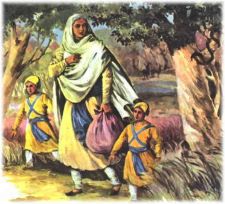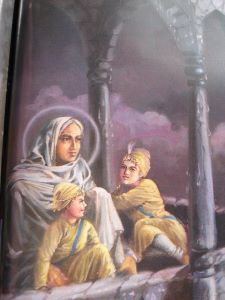THE BRAVE AND fearless Sikhs of Guru Gobind Singh were engaged in a prolonged battle with the Mughal army outside the fort of Anandpur for months. Emperor Aurangzeb sent a message under oath, promising safe passage for the Guru and his Sikhs if they left the fort.
Guru Gobind Singh, though hesitant, agreed to leave the fort upon the persuasion of his devoted Sikhs. However, the Mughals betrayed their promise. As soon as the Sikhs emerged from the fort, the Mughal army attacked. A fierce battle ensued on the banks of the Sirsa River, where the valiant Sikhs fought with unparalleled courage, each one of them killing numerous Mughal soldiers before sacrificing themselves.
In the chaos of the battle, members of Guru Gobind Singh’s family became separated. The two younger sons, Sahibzada Zorawar Singh and Sahibzada Fateh Singh, along with their revered grandmother, Mata Gujri Ji, journeyed through dense forests and challenging terrains. They encountered wild animals, including lions and snakes, but the brave Sahibzadas fearlessly continued their journey, reciting the holy psalms of their Gurus in the company of their grandmother. Mata Gujri Ji shared stories from Sikh history with them, making their journey more bearable.
The two elder brothers, Sahibzada Ajit Singh and Sahibzada Jujhar Singh, accompanied their father, Guru Gobind Singh. After crossing the Sirsa River, they stayed at Roper for the night and reached the Chamkaur Fort the following morning.
After an arduous journey, Mata Gujri Ji, along with the two Sahibzadas, reached the hut of a Muslim water carrier named Kuma. Upon seeing Mataji, Kuma rushed out and, with folded hands, requested her to bless his humble cottage by staying there. Pleased with his devotion, Mataji decided to halt for the night.
The next morning, Gangu, the old Guru’s domestic servant, arrived. He urged Mataji to accompany him to his village, assuring her that they would be safe there and their whereabouts would remain unknown to the Emperor’s officials. Though initially hesitant, Mataji agreed to his persistent requests. After loading their luggage onto a pony, they set out for his village. The two Sahibzadas walked alongside their grandmother, frequently inquiring about their father and elder brothers.
Mata Gujri and the Younger Sahibzadas Search the Forests Before Settling at Gangu’s House
After trekking throughout the day, they reached the village of Kheri in the evening. Upon arriving at Gangu’s house, Mataji placed her belongings in a corner of a room. The Sahibzadas changed their clothes, recited the evening prayer, and went to sleep in their grandmother’s embrace.
At midnight, Gangu quietly entered their room. Seeing Mataji resting with her eyes closed, he presumed she was asleep. He reached into her bag, removed the gold coins, and slipped out of the room. Mataji heard the sound of footsteps but chose to ignore it and continued resting.
The next morning, she asked Gangu, “Our belongings are scattered. I hope the outer door was closed. Where are the gold coins?” Gangu looked blank and rushed out of the house, shouting for help to find the thief. Mataji called him back and asked him not to create unnecessary fuss. Gangu, however, insisted on finding the thief. Mataji tried to pacify him, even offering him the gold coins if he desired. Enraged, Gangu accused Mataji of suspecting him and left the house, heading straight to the police station at Morinda.
Upon reaching Morinda, Gangu approached the Kotwal and, after paying his respects, requested to convey some confidential information. Gangu then informed the Kotwal that Guru Gobind Singh’s mother and his two young sons were hiding in his house. Delighted with this news, the Kotwal dispatched his constables along with Gangu to arrest them.
When the constables reached Gangu’s house, some neighbors peered out. The constables ran to the back of the house and were surprised to see Mata Gujri Ji and the two Sahibzadas sitting calmly. They informed them of the Kotwal’s orders to arrest them. Mata Gujri Ji embraced her grandsons, who were prepared to go. A small crowd had gathered outside the house, with people cursing Gangu for his dishonesty and betrayal. They were impressed by the divine looks and graceful bearing of Mataji.
Upon reaching the police station, Mata Gujri Ji and the two Sahibzadas were detained for the night. The brothers listened to tales of bravery from their grandmother, including the unique martyrdom of Guru Arjan Dev and Guru Tegh Bahadur. They joined their grandmother in reciting the evening Sikh prayers, Rahras, and Kirtan Sohila, before retiring to bed.
Early next morning, they were taken in a bullock cart to the Bassi police station. News of their arrest had spread far and wide, with large crowds gathering along the way. People were astonished that young, innocent boys were being arrested alongside their venerable grandmother.
The Sahibzadas’ fearless demeanor aroused admiration, with people remarking, “They are the brave sons of their brave father.” The onlookers’ remarks made the constables anxious, prompting them to walk faster. The cart driver also whipped the bullocks to reach Sirhind quickly.
Upon arriving at Sirhind, they were lodged for the night in a cold room in the tower.
At great risk to his life, one of Guru’s devotees, Bhai Moti, managed to send milk for Mataji and the Sahibzadas. The Sahibzadas listened to episodes from Sikh history, related to them by their grandmother. Inspired by the ideals set by the Gurus, the two Sahibzadas assured Mata Gujri Ji that they would uphold their faith and follow in their illustrious father’s footsteps. Mataji was pleased to hear this and admired her grandchildren’s courage and firm determination.
The following morning, the police constables informed Mataji that they had orders to take the two boys to the Nawab’s court. Upon Mataji’s inquiry about the reason, they replied that they were unaware and were merely following orders. Mataji embraced her grandsons, blessed them, and urged them to uphold the sacred traditions of the Gurus. The two Sahibzadas pledged to do so and departed cheerfully.
The two Sahibzadas walked boldly towards the court, accompanied by the constables. As they approached the court, they noticed that the main gate was closed, with only a small window for entry. The window was positioned in such a way that the Sons of Guru Gobind Singh would have to bow to the Quran, which the Qazi was holding across the door. The intelligent Sahibzadas saw through this ploy and jumped inside through the window without bowing their heads.
The Nawab’s court was in session. As the two Sahibzadas stepped inside, they greeted the courtiers with the Sikh salutation, “Waheguru Ji Ka Khalsa, Waheguru Ji Ki Fateh!”
The court resounded with their greeting, and all the courtiers were greatly impressed by their fearless behavior. Dressed in saffron shirts with Kirpans worn around their wrists, the Sahibzadas looked remarkably sweet. Nawab Wazir Khan addressed them affectionately, saying, “What sweet and brave faces! Islam would be proud to have you within its fold. Simply recite the Kalma (Muslim benediction), and we shall welcome you into our midst. You can ask for anything you desire.”
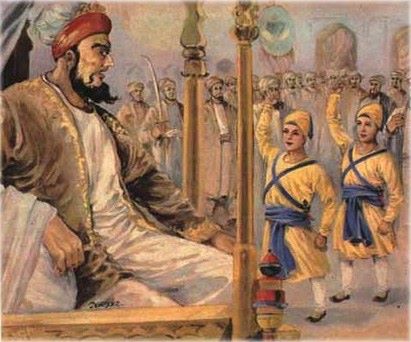
The younger Sahibzade in high spirits when appearing before Nawab
The two Sahibzadas responded in unison, “We do not care for worldly wealth. We shall not renounce our religion at any cost.” The Nawab was annoyed by their reply but remained silent.
Addressing the Qazi, the Nawab said, “Have you observed the insolent behavior of these boys? Do not consider them innocent. They are the rebellious sons of a rebel. They must be punished.”
The Qazi responded that, according to Islamic law, the two boys were not guilty of any crime and could not be held responsible for their father’s actions.
The Nawab, however, insisted that they were rebels too, citing their rude statements. The Qazi stood firm, reiterating that they had not committed any crime. Nawab Wazir Khan was taken aback by the Qazi’s unexpected response.
The Nawab again tried to persuade them, saying, “You are still young and innocent. It is your age for enjoyment and fun. If you heed our advice, you will enjoy life to your heart’s content in this world and be blessed with a glorious life in Paradise.”
Sahibzada Zorawar Singh spoke fearlessly, “We are fighting against tyranny and injustice. We are the sons of Guru Gobind Singh, the grandsons of Guru Tegh Bahadur, and descendants of Guru Arjan Dev. We shall follow in their footsteps. We are prepared to make any sacrifice for the protection of our faith.” In a low voice, the Nawab remarked, “How proud of their faith!”
One of the officials of the Mughal government, Dewan Sucha Nand, approached the Sahibzadas and asked them, “If you are released, where will you go?” Sahibzada Zorawar Singh replied, “We shall go to the forests, gather a few Sikhs, obtain a good horse, and then confront you and your army on the battlefield.”
Upon hearing this, Dewan Sucha Nand remarked, “Do you know that your father has been slain?” Both brothers reacted angrily, “No one can kill our respected father. He will never fall into your hands.” The two Sahibzadas shouted, “We do not need any advice from you. Listen carefully. Until this tyrannical government is completely eradicated, we shall continue to fight.”
Dewan Sucha Nand was taken aback by their reply. Addressing the Nawab, he said, “Sir, killing the serpent and feeding its young ones would not be wise. When these young children grow up, they will rebel against the government. They must be punished and should not be released under any circumstances.”
The Nawab considered Dewan Sucha Nand’s words. The two Sahibzadas, oblivious to the grave situation, continued conversing fearlessly with each other, astonishing the courtiers with their lack of fear or anxiety despite facing the possibility of death.
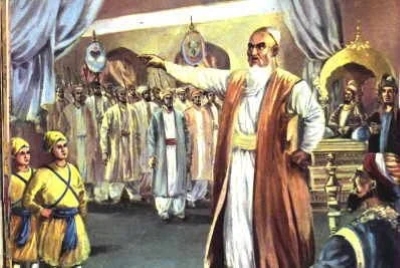
Qazi pronouncing the Fatwa
The Nawab then instructed the Qazi, “You have heard the impertinent answers given by them to Dewan Sucha Nand. It would not be safe to release them. They are sure to raise the banner of revolt, like their father, when they grow up.”
The Qazi, having witnessed the conversation between Dewan Sucha Nand and the two bold sons of Guru Gobind Singh, pronounced the judgment, ordering that they be bricked up alive in a wall, a standard punishment in Islamic law for seditious activities against the Muslim state.
The Sahibzadas heard the sentence without dismay, while the courtiers were taken aback by the judgment. The Qazi advised the Nawab to hand over the Sahibzadas to the Nawab of Malerkotla for carrying out the sentence, as his brother had been killed by Guru Gobind Singh, providing an opportunity for revenge.
Nawab Wazir Khan conveyed the Qazi’s orders to Sher Mohammad Khan, the Nawab of Malerkotla. Upon hearing the Qazi’s order, Sher Mohammad Khan was dumbfounded. After a pause, he said to the Nawab in a faltering voice, “This is cruelty! My brother was killed on the battlefield. These innocent boys are not responsible for his death. If we must seek revenge, it should be from the father. God save us from this sinful act.” He then got up and remarked in a mournful tone, “O God, how cruel!”
Thereafter, the Nawab ordered the two boys to be sent back to the tower. He instructed his officials to arrange for executioners who would brick them alive between two walls, which were to be constructed immediately.
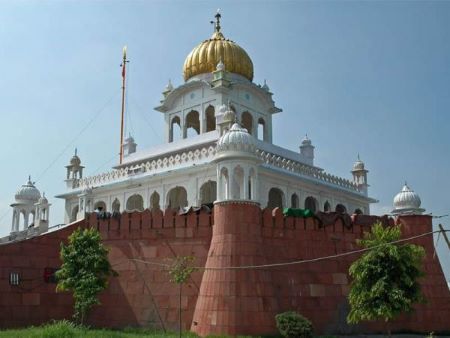
Gurdwara Thanda Burj, where Mata Gujri and the Younger Sahibzade where kept
The Sahibzadas reached the tower and reported the court proceedings to their grandmother. She embraced her grandsons, patted them on their backs for their courageous and bold stand, and said, “You have rightly upheld the dignity and honor of your revered grandfather and your valiant father. May God always be with you.”
The next morning, they were taken to the Nawab’s court. The Nawab again asked them, “I hope you have reconsidered and decided to embrace Islam, otherwise, as you know, you will be bricked up alive.”
Both Sahibzadas proclaimed fearlessly, “We shall never abandon our faith, regardless of the consequences. Death holds no fear for us.” The Nawab was simply amazed at their unwavering determination.
One of his officials stepped forward and said to the Nawab, “Sir, the two royal executioners of Delhi, Shisal Beg and Vishal Beg, are present in the court. They are prepared to carry out your orders and brick up these boys alive if granted pardon.” The Nawab granted their request on the condition that they brick up the two sons of Guru Gobind Singh alive.
The constables took away both Sahibzadas. A large crowd had gathered outside the Nawab’s court, knowing that the two young, innocent sons of Guru Gobind Singh were to be bricked alive. “What crime have they committed?” exclaimed one. “How cruel and inhuman! O God!” lamented another. “But they are not terrified,” remarked a lady in the crowd. “They are brave sons of their brave father, Guru Gobind Singh,” responded her companion.
The constables escorting the two Sahibzadas were becoming increasingly perturbed by the crowd’s observations and rushed forward. The Sahibzadas were brought to the spot where a wall was being constructed. They were made to stand side by side.
The Qazi arrived soon after and tried to persuade them to accept Islam and save their lives. Even the executioners tried to prevail upon them, but they remained steadfast in their determination, telling the executioners, “Raise the wall quickly and bury the Mughal Raj swiftly. Do not delay for a minute.” Thereafter, they both began reciting Japji while the wall was being constructed brick by brick.
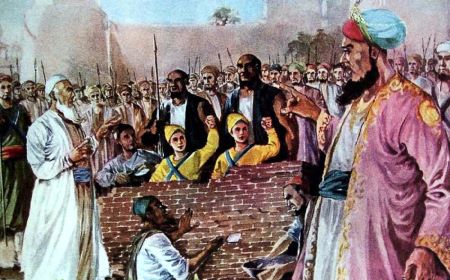
Sahibzada Zorawar Singh And Fateh Singh Being Bricked Alive At Sirhind
The wall rose higher and higher until it reached their chests. The Nawab and Qazi approached them and said in an affectionate tone, “There is still time for you to save your lives. Simply recite the Kalma, and the wall will be pulled down immediately.”
The Sahibzadas shouted loudly, “We shall not abandon our faith. Death does not frighten us.” The Nawab and Qazi were astonished by their steadfast determination. Tears flowed from the eyes of onlookers as they observed, “Blessed are their mother who gave birth to such children.”
The wall continued to rise, reaching shoulder height. Sahibzada Zorawar Singh said to his younger brother, “They are testing us. They do not know that the Sikhs of Guru Nanak are fearless. Our Fifth Guru, Arjan Dev, faced martyrdom cheerfully on burning iron pans. While he guided humanity on the path of a truthful and noble life, he also set an example of facing death boldly with unwavering faith in God.”
Sahibzada Fateh Singh remarked, “The martyrdom of our revered grandfather, Guru Tegh Bahadur, was also extraordinary. We shall soon join him. He is waiting for us.” Later, both Sahibzadas became unconscious. The executioners, becoming nervous, consulted each other. “They are near their end. There is no need to raise the wall further. Why not end their agony by beheading them? It is already getting dark.”
The wall was pulled down. They brought the unconscious Sahibzadas out, laid them flat on the ground, and swiftly martyred them. The crowd was shocked by this ghastly act. They sighed in dismay, “What cruelty!”
As soon as the two Sahibzadas attained martyrdom, Mata Gujri Ji, who was sitting in meditation in the tower, breathed her last. The messenger who brought the news of the Sahibzadas’ martyrdom found that Mataji had already attained salvation. There was great commotion in the town of Sirhind.
Everyone was furious at the atrocious crime. They unanimously believed that this heinous act would herald the doomsday of the Mughal Empire. They admired the courage and steadfastness of the brave sons of Guru Gobind Singh, remarking, “What determination at such a young age! They did not waver an inch from their position despite numerous enticements by the Nawab and Qazi.”
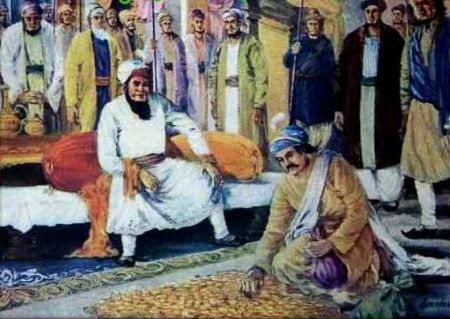
Dewan Todar Mal spreading gold coins
The same evening, Dewan Todar Mal, a jeweller, sought permission from Nawab Wazir Khan to cremate the dead bodies of the two Sahibzadas and Mata Gujri Ji. The Nawab agreed on the condition that the Dewan pay for the required piece of land by spreading as many gold coins as would cover the entire spot.
The Dewan accepted the terms and brought bags full of gold coins. He marked the site and spread coins across the entire piece of land he selected for cremation.
The two martyred young sons of Guru Gobind Singh were cremated with full honors along with their grandmother. There is no parallel to the martyrdom of such young boys in the annals of human history.
Sahibzada Fateh Singh was less than six years old (born in 1699), and Sahibzada Zorawar Singh was just over eight (born in 1696). They laid down their lives in December 1705. They were to be bricked alive but did not bow before the tyranny of the Mughal government.
Guru Gobind Singh, who was in the forests of Machhiwara at the time, received news of his younger sons’ martyrdom.
Upon hearing this, he pulled out a plant with the tip of his arrow and prophesied that this tragedy would herald the uprooting of the Mughal Empire in India.
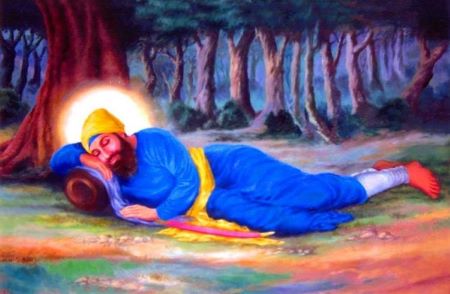
Guru Gobind Singh in Macchiwara
To the Emperor, he wrote, “It matters little if a jackal, through cunning and treachery, succeeds in killing two lion’s cubs, for the lion himself lives to inflict retribution on you.”
Guru Gobind Singh addressed his followers, “I have sacrificed four sons for the survival of the thousands of my sons who are still alive” (all Sikhs are considered Guru Gobind Singh’s sons and daughters).
A wave of anguish gripped the country at the news of the Sahibzadas’ martyrdom. After some time, the recluse Banda Bairagi came under the influence of Guru Gobind Singh Ji, was made Khalsa as Banda Singh Bahadur, and shook the Mughal empire. The town of Sirhind was reduced to utter ruins.
The renowned Hindi poet, Maithli Saran Gupta, in his well-known book Bharat Bharati, said, “Whatever their present position, the future of the community whose sons can thus lay down their lives for their faith is bound to be glorious.”
The martyrdom of Sahibzada Zorawar Singh, Sahibzada Fateh Singh, and Mata Gujri Ji marks a profound moment in Sikh history. Their sacrifice is commemorated annually during Shaheedi Jor Mela, where Sikhs and people of all faiths pay homage to these young martyrs.
Their story is not just one of bravery but also a reminder of the strength derived from faith and principles. Their sacrifice remains an eternal symbol of resistance against tyranny and injustice, inspiring people to uphold truth and righteousness in the face of adversity.
As Guru Gobind Singh Ji aptly said, “In the midst of this, he who stands his ground is the true human.”
Their martyrdom continues to inspire generations, reminding us that true strength lies in unwavering commitment to one’s beliefs and the courage to stand against oppression. ![]()
Courtesy: https://sikhunity.wordpress.com
Also Read: Nasro Mansoor Guru Gobind Singh
Disclaimer : PunjabTodayNews.com and other platforms of the Punjab Today group strive to include views and opinions from across the entire spectrum, but by no means do we agree with everything we publish. Our efforts and editorial choices consistently underscore our authors’ right to the freedom of speech. However, it should be clear to all readers that individual authors are responsible for the information, ideas or opinions in their articles, and very often, these do not reflect the views of PunjabTodayNews.com or other platforms of the group. Punjab Today does not assume any responsibility or liability for the views of authors whose work appears here.
Punjab Today believes in serious, engaging, narrative journalism at a time when mainstream media houses seem to have given up on long-form writing and news television has blurred or altogether erased the lines between news and slapstick entertainment. We at Punjab Today believe that readers such as yourself appreciate cerebral journalism, and would like you to hold us against the best international industry standards. Brickbats are welcome even more than bouquets, though an occasional pat on the back is always encouraging. Good journalism can be a lifeline in these uncertain times worldwide. You can support us in myriad ways. To begin with, by spreading word about us and forwarding this reportage. Stay engaged.
— Team PT

